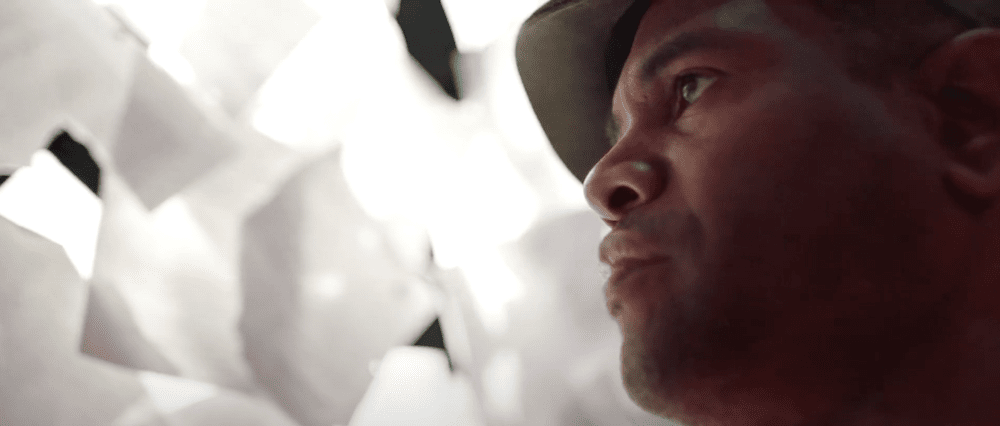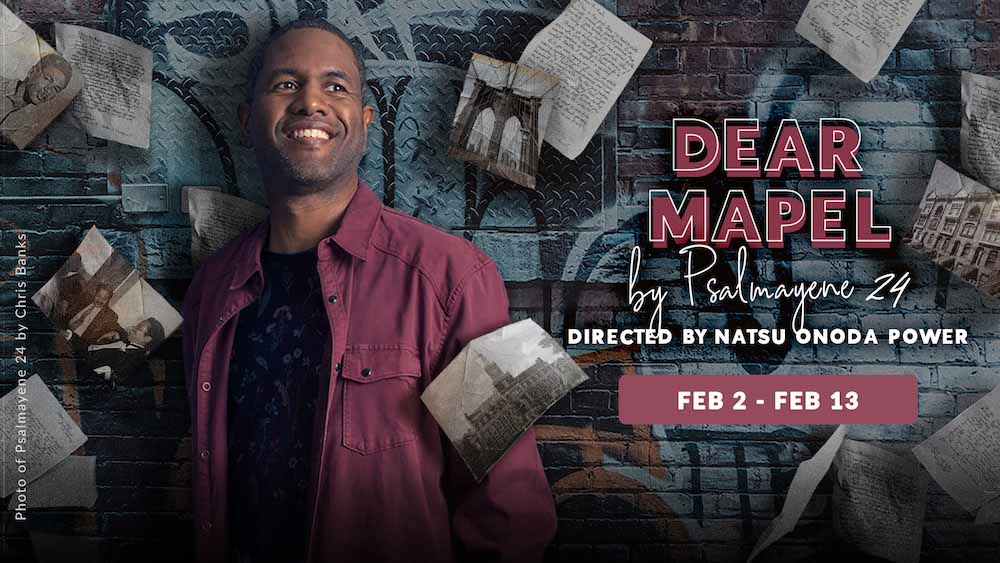When the world premiere of Dear Mapel opens at Mosaic Theater next week, audiences who saw the play in its workshop version will be in for a big surprise. That’s because the virtual workshop, which streamed in January 2021, has undergone a radical change. In fact, it’s hard to believe it’s the same play.
Yes, it’s still a story about a boy, writing letters that he doesn’t mail, to a father who isn’t there. It’s a hip-hop riff on loss, funny and haunting at the same time. But different.
What happened? I spoke to Psalmayene 24 over the phone last week and asked the versatile playwright and actor — whose story this is — to explain.

“COVID, for one thing,” he replied. “The workshop took place during the peak of the pandemic, so we had no choice but to mount a digital version. The extensive use of multi-media was a by-product of the fact that the performance was streamed.”
Artistic vision, combined with the insight of a fine director, produced the rest of the change, which includes a new ending. “The workshop version was essentially unfinished,” he explained, adding that the new segments — which make up about a third of the current production — add a whole new dimension to the play.
“What people saw on screen, a little more than a year ago, was only one part of the story. For me, the new ending offers a much-needed sense of completion,” he said, pointing out that it allowed the creative team — consisting of himself, director Natsu Onoda Power, and composer-percussionist Jabari Exum — to get rid of a lot of extraneous elements.
For Psalm — as he likes to be known — much of the credit for the new production goes to Power, whose influence informed many of the new segments of the play.
“She is nonjudgmental and a great listener, someone who understands the story beyond the script,” he said. “She helped me to see — and illuminate — the themes that linked the memories. She didn’t shoehorn her own ideas or opinions into the play.”
Since the play is so personal, I wondered if he could see any other actor performing the role.
“Absolutely,” he laughed. “Right now, I want to perform it myself — partly because I know the writer so well — but I can see other actors playing the role. Maybe in a century or so?
“But seriously,” he added, correcting the record, “I think many actors will fill my shoes. And I can certainly see a woman playing the role.”
Although the play is autobiographical, it is definitely — and deliberately — not fictionalized. Instead, it is shaped by memory and imagination. The format — using letters that he imagines sending to Mapel — is a classic form of storytelling.
“In real life,” he told me, “I wrote a single letter to Mapel, and he responded to it. There was a personal connection. We met twice. And then he was gone.” The two were so completely estranged that Psalm did not learn of his father’s death until three years after it happened.
“Those two meetings and the sense of connection they created are virtually tattooed in my mind,” he said. “But the fact is that he was always gone. He was never there. His absence created a giant hole in my life. It was like a black hole in the universe, exercising a gravitational pull. It drew me in and defined me.”

Psalm — whose real name is Gregory Morrison — adopted the pseudonym when he was 23 and experiencing his first success in theater.
“Psalmayene,” he told me, “means one who creates sacred songs. It represented my desire to escape the boundaries separating art and life.” He chose the number 24 because it marked his next birthday, and was said to bring luck to its bearer.
Now 48, he was born and brought up in Park Slope, in a modest brownstone bought by his grandfather long before the area became one of the trendiest in Brooklyn. The house, while small, was large enough to accommodate three generations of an extended family, including Psalm and his mother, his grandparents, cousins, and aunts.
He attended Midwood High School — the launching pad for many entertainment greats — and then Howard University, here in DC, where he studied film production and acting.
It was at Howard that he experienced his first success on stage. He co-founded a dance company and discovered that he could actually earn an income through performance. “It was a wake-up call,” he said. From there on, his career took off.
His first big splash was writing and directing for Imagination Stage, where his Hip Hop Children’s Trilogy garnered more grants and awards than most people can count.
At that point, he embraced his identity as a playwright, actor, and director, moving easily from one role to another, and from TV (where he can be seen in The Wire) to stage.
“No matter what the medium,” he said, “the important thing is transforming lives — telling stories that can start a revolution in the collective consciousness.”
Running Time: 90 minutes, with no intermission.
Dear Mapel — written and performed by Psalmayene 24, directed by Natsu Onoda Power, with percussion by Jabari Exum — runs in-person from February 2 to 13, 2022, presented by Mosaic Theater Company at the Atlas Performing Arts Center, H Street NE, Washington DC. Tickets for general admission are $50 each and can be purchased online or by calling 202-738-9491. Open-captioned performances are February 5 at 8 PM, February 10 at 11 AM, and February 10 at 8 PM (includes ASL postshow).
Dear Mapel also streams from February 2 to 13, 2022. Tickets for the virtual option are $40 for individuals and $70 for groups, available online. Viewers have 72 hours in which to watch the performance. Closed captions are available.
COVID Safety: All patrons, actors, and staff must comply with Mosaic Theater Company and Atlas Performing Arts Center’s policies and protocols for COVID-19 safety.
SEE ALSO:
A son summons his absent father in ‘Dear Mapel’ at Mosaic Theater (review of the virtual workshop by Lisa Traiger)
Reginald L. Douglas on the next chapter at Mosaic Theater (interview with Mosaic’s new artistic director by Ramona Harper)
Reginald Douglas in conversation with Psalmayene 24 and Natsu Onoda Power:





